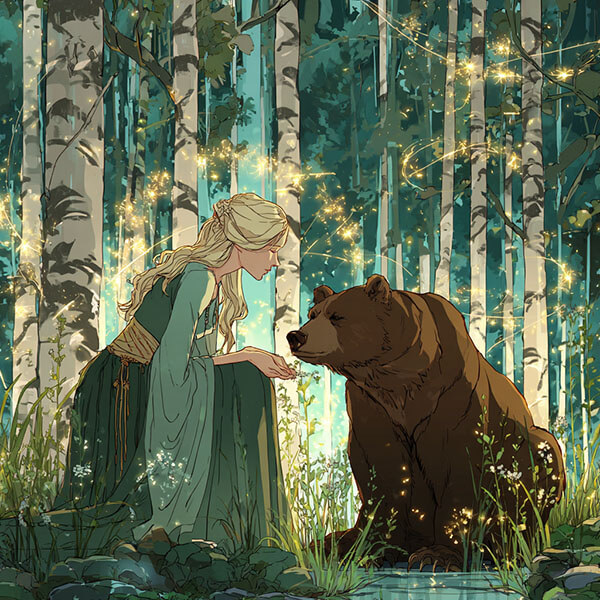
Mielikki
Goddess of the Forest
Karelian / Finnish Mythology
Mielikki is the Goddess of the Forest and rules the lands of Tapiola with her husband Tapio. She is often seen as the embodiment of the forest itself. Although she is often described as a beautiful woman dressed in green clothing that wanders the forest.
While her husband is a stern ruler, Mielikki’s demeanor is that of a gentle, kind, and healing woman. She shows mercy upon injured animals by healing them. Hunters often pray to this Goddess when an animal’s paw is stuck in a trap, asking for her healing powers to ease the animal’s suffering.
Mielikki also is responsible for ensuring worthy hunters find game during their hunts. Hunters even pray for her to fill their traps with game. In order to avoid bad luck, hunters often pray to Mielikki and Tapio to show their respect for the forest, animals, and nature.
- Domain: Forests and woodlands
- Realm: Tapiola
- Symbol: Bear, trees, berries
- Weapon/Relic: Bow and arrow
- Spouse: Tapio
- Children: Tellervo and Nyyrikki
- Worship: Leaving offerings at Tapio’s grove
- Offerings: Bread, beer, or coins
- Holidays: None
Appearance in the Kalevala
Mielikki is called upon by the heroes in hunting songs throughout the Kalevala. Most notably, Lemminkäinen calls upon the Goddess’s guidance during his hunt for the Hiisi Elk in his quest from Louhi.
The Hiisi Elk is a sacred creature, under the protection of Mielikki and Tapio. The hero Lemminkäinen must properly ask the gods for their blessing to complete his hunting mission. By showing respect, they allow the elk to be revealed to the hero during his quest.
Väinämöinen also calls upon Mielikki and Tapio; however, his requests are more docile as he is not an active hunter. He asks for guidance and passage from the forest goddess. In Canto 14, Väinämöinen asks for guidance and sacred plants to use for his magic. Later, the hero asks for herbs and magical ingredients.
Mielikki is happy to grant the requests of Väinämöinen as he shows a deep respect for nature, only taking what he needs without harming the forest.
Symbolism of Mielikki
Those who do not respect the forest are unable to hunt, gather, or pass through the forests successfully. The land of Tapiola would be devoid of game for hunters without the guidance of Mielikki, Tapio, and their children.
Sacred animals to this Goddess include elk, deer, bear, and other forest creatures. Otso, the sacred bear, is Mielikki’s golden child. He is the guardian of the forest, both feared and respected by hunters.
Mielikki is responsible for maintaining the balance of the forest, ensuring life can thrive and hunters can receive the abundance the forests have to offer. Tapiola is a source of sustenance for Finns and thus commands their respect.
Karhunpeijaiset’s Importance
Karhunpeijaiset, or the bear feast, is a sacred ritual to ancient Finns. In this tradition, bears are treated as sacred animals and not simply game. They represent strength, resilience, and the power of the forest.
Bears are close to divinity and are under the protection of Mielikki and Tapio. As such, hunting bears is a sacred and rare tradition in pre-Christian Finland.
